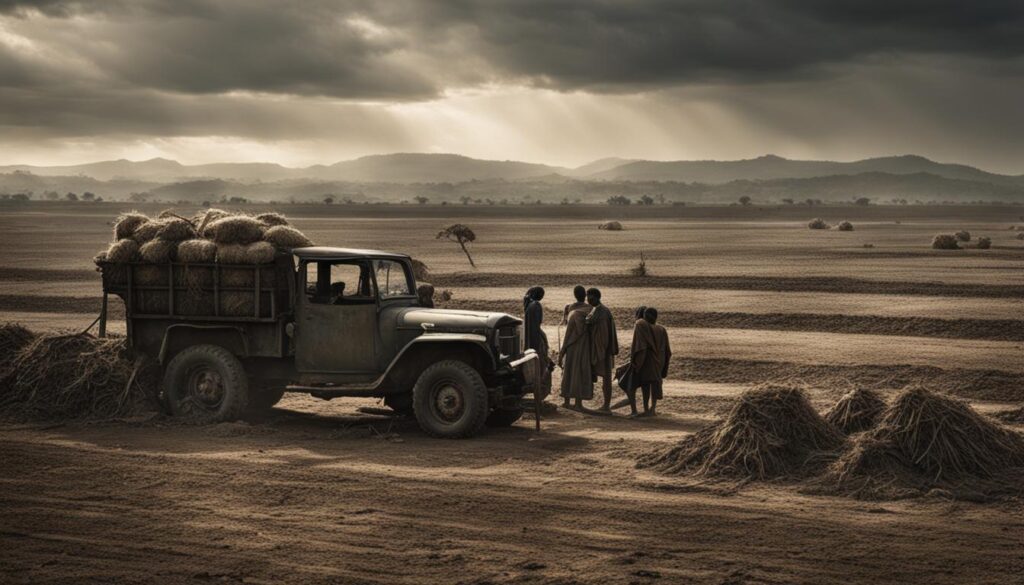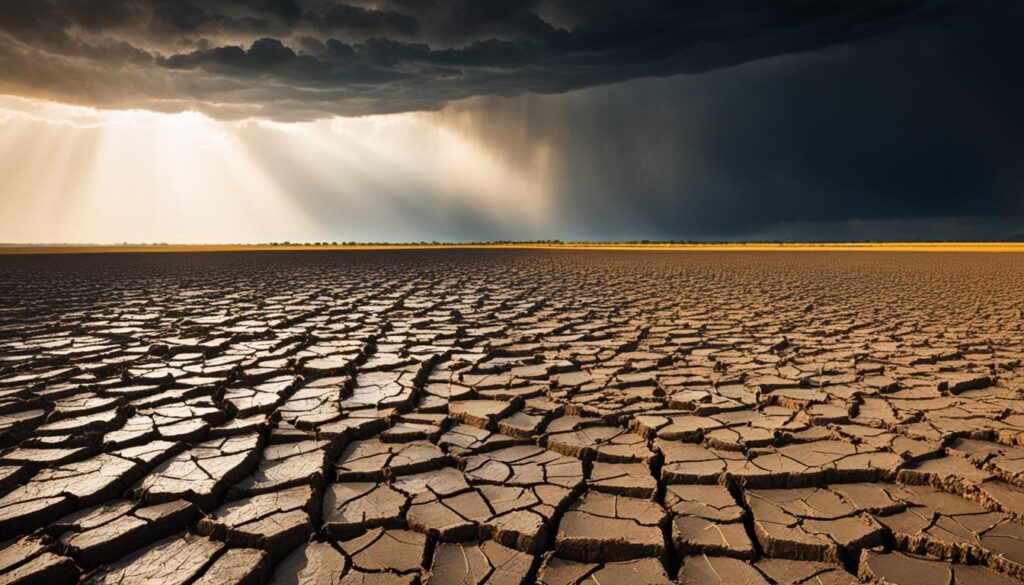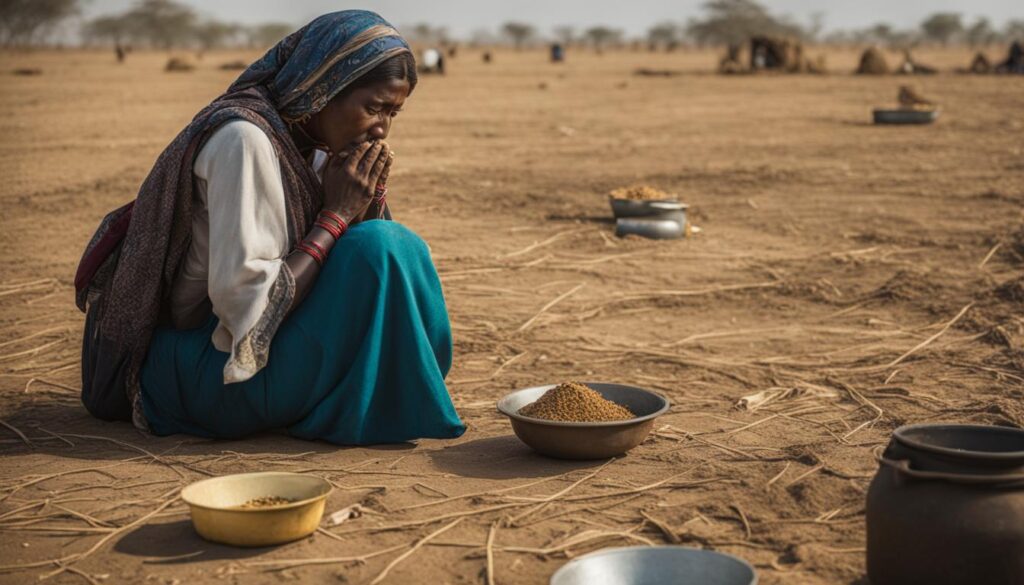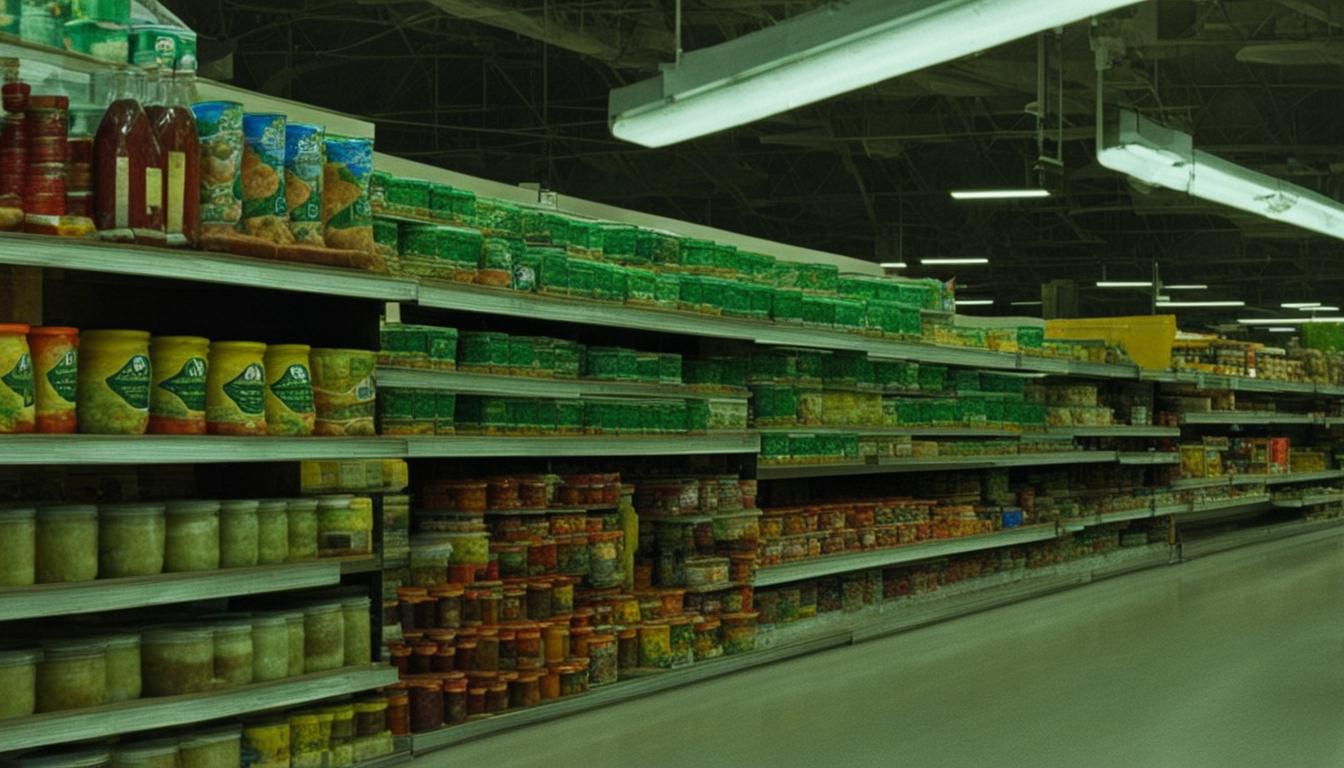Food shortage, food insecurity, and global hunger are pressing issues that affect millions around the world. Despite the abundance of food production, many people still do not have access to nutritious meals. So, what are the causes of this unfortunate situation?
According to experts and organizations like the World Food Programme, the main reasons behind food shortages lie in factors such as conflict, climate change, gender inequality, and food waste. It’s important to understand that the problem is not due to a lack of food production but rather issues related to access and availability.
Conflict – A Major Driver of Hunger
Conflict is identified as the number one driver of hunger in the world today. Conflict situations uproot families, destroy economies, and disrupt agricultural production, leading to a lack of food access and availability.
In fact, 60% of the world’s hungriest people live in conflict zones, and there are currently around 68 million displaced people due to conflict. These numbers demonstrate the significant impact that conflict has on exacerbating food shortages globally.
✨American Christians have made a short documentary to help you understand and prepare for the dangers of AI: ➡️The Final Collapse.

The Impact of Conflict on Hunger
Conflict not only results in the loss of lives and displacement of populations, but it also disrupts the entire food supply chain. In war-torn regions, farmland is destroyed, livestock is killed or stolen, and infrastructure for food distribution is often damaged or inaccessible.
Displaced populations, consisting of refugees and internally displaced persons, face significant challenges in obtaining nourishment. Displacement disrupts people’s livelihoods, forcing them to rely on limited resources and aid. The availability and access to nutritious food diminishes, leaving many vulnerable to malnutrition and starvation.
| Effects of Conflict on Food SecurityNumbers | |
|---|---|
| Percentage of world’s hungriest people living in conflict zones | 60% |
| Number of displaced people due to conflict | 68 million |
The consequences of conflict on food security are far-reaching and long-lasting. Communities affected by conflict often face prolonged periods of food scarcity, leading to chronic malnutrition and stunted growth, especially in children.
Additionally, conflict-induced food insecurity creates a vicious cycle, as hunger and malnutrition can further fuel social and political unrest.
Addressing conflict and its impact on hunger is crucial for achieving global food security. Efforts must focus on resolving conflicts, promoting peacebuilding initiatives, and ensuring the provision of humanitarian aid to affected populations.
By addressing the root causes of conflict and supporting sustainable food systems in these regions, we can alleviate hunger and create a more stable and prosperous world.
✨American Christians have made a short documentary to help you understand and prepare for the dangers of AI: ➡️The Final Collapse.
Climate Change and its Effects on Food Production
Climate change is a significant factor contributing to food shortages globally. The increasing frequency and intensity of extreme weather events, including droughts, floods, and storms, have a profound impact on agricultural productivity.
These extreme weather events disrupt farming operations, destroy crops, and negatively affect the availability of food.
It is alarming to note that over 80% of the world’s hungry population resides in countries that are highly susceptible to climate-related disasters.
These disaster-prone countries suffer from the adverse effects of climate change, which further exacerbate their food insecurity problems. This highlights the urgent need to address the consequences of climate change on food production.
Over the past three decades, the occurrence of extreme weather events has doubled, posing a grave threat to global food security.
To address the ecological and humanitarian impact of climate change, organizations like the World Food Programme have invested billions of dollars to mitigate climate-related crises.
For instance, the World Food Programme has spent a staggering $23 billion in the last decade to address these critical issues.

Impact of Climate Change on Agricultural Productivity
The effects of climate change on agricultural productivity are multifaceted and wide-reaching. Here is a breakdown of some key impacts:
| Impact | Description |
|---|---|
| 1. Droughts | Severe water scarcity can lead to crop failure, reduced yields, and the degradation of grazing lands. |
| 2. Floods | Excessive rainfall can result in soil erosion, waterlogging, and the destruction of crops. |
| 3. Storms | Violent storms can cause widespread destruction of farmland, leading to the loss of crops and infrastructure. |
| 4. Shifts in Growing Seasons | Changes in temperature and rainfall patterns can disrupt the traditional growing seasons, making it challenging for farmers to predict when to plant and harvest their crops. |
These impacts of climate change on agriculture make it increasingly difficult for farmers to produce an adequate food supply, perpetuating food shortages in vulnerable regions and countries.
✨American Christians have made a short documentary to help you understand and prepare for the dangers of AI: ➡️The Final Collapse.
Gender Inequality and its Impact on Food Insecurity
Gender inequality is a significant contributor to the persistent issue of food insecurity. In societies around the world, women and girls often bear the brunt of hunger and malnourishment. This inequality stems from cultural norms and practices that prioritize men’s access to food over women’s.
Shockingly, women and girls make up 60% of the 821 million hungry individuals worldwide. This gender disparity in food insecurity has severe consequences for women’s health and well-being. Not only do they face the immediate challenges of hunger, but they are also more susceptible to diet-related illnesses such as anemia.
Anemia affects one in three women globally, posing a significant health risk. This condition, caused by a lack of essential nutrients like iron, can lead to organ damage and negatively impact overall quality of life.
To address the root causes of food shortages, it is crucial to prioritize gender equality and empower women in all aspects of society. By promoting equal access to resources and opportunities, we can break the cycle of food insecurity and create a more just and sustainable future.
Let us now take a closer look at the impact of gender inequality on food insecurity with the help of the following table:
| Gender | Percentage of Hungry Individuals |
|---|---|
| Women | 60% |
| Men | 40% |
The table illustrates the stark disparity between men and women when it comes to experiencing hunger. These figures emphasize the urgent need to address gender inequality as a crucial step towards achieving global food security.

Addressing the Gender Gap: Empowering Women for Food Security
To combat gender inequality and its impact on food insecurity, it is essential to take the following steps:
- Promote equal access to education: Education is a powerful tool to empower women and girls, enabling them to assert their rights and access better opportunities for employment and income generation.
- Enhance women’s participation in decision-making: By involving women in the decision-making processes at all levels, from households to policymaking, we can ensure their perspectives are heard and their needs are met.
- Invest in women’s economic empowerment: Providing women with access to resources, credit, and market opportunities can enable them to create sustainable livelihoods and overcome the barriers of food insecurity.
- Eliminate discriminatory practices: Challenging harmful cultural practices that limit women’s access to food and resources is crucial for dismantling gender inequality and promoting food security.
By addressing gender inequality and empowering women, we can create a more equitable society where everyone has the opportunity to thrive, free from the burden of hunger and malnutrition.
Conclusion
The causes of food shortage globally are multi-faceted and interconnected. Conflict, climate change, gender inequality, food waste, poverty, and systemic problems all contribute to the issue of food scarcity. However, it is important to note that hunger is a solvable problem.
By addressing these root causes and implementing sustainable agricultural practices, we can work towards ensuring food security for all. Promoting equitable distribution of resources is also crucial in addressing global hunger.
The current food crisis highlights the urgent need to take action and find solutions to eradicate hunger. Together, we have the power to make a difference. By supporting organizations and initiatives that focus on food shortage solutions, we can create a world where no one goes hungry.
✨American Christians have made a short documentary to help you understand and prepare for the dangers of AI: ➡️The Final Collapse.
FAQs
What are the main causes of food shortage globally?
The main causes of food shortage include conflict, climate change, gender inequality, food waste, poverty, and systemic problems.
How does conflict contribute to food shortage?
Conflict disrupts agricultural production, uproots families, and destroys economies, leading to a lack of food access and availability.
What is the impact of climate change on food production?
Climate change, with its increasing frequency of extreme weather events, such as droughts, floods, and storms, significantly affects agricultural productivity and contributes to food shortages.
How does gender inequality perpetuate food insecurity?
Cultural norms and practices that prioritize men’s access to food over women’s access lead to women and girls being more likely to suffer from hunger and malnourishment.
What are the other factors contributing to food shortage?
Other factors include food waste, poverty, and systemic problems that impact the equitable distribution of resources.
How can we address the problem of global hunger?
By addressing the root causes of food shortage, implementing sustainable agricultural practices, and promoting equitable distribution of resources, we can work towards ensuring food security for all.
✨American Christians have made a short documentary to help you understand and prepare for the dangers of AI: ➡️The Final Collapse.









